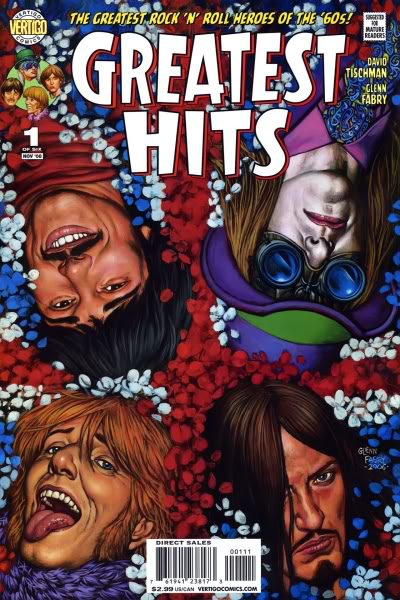Greatest Hits
by Martin Skidmore 09-Jan-11
Sometimes it’s easy to see the pitch: what if the Beatles had been superheroes? A decent idea, and it gives you lots to work with. Trouble is, it rather sets up claims for the story that are not remotely fulfilled.
 by David Tischman & Glenn Fabry; Vertigo.
by David Tischman & Glenn Fabry; Vertigo.
Sometimes it’s easy to see the pitch: what if the Beatles had been superheroes? A decent idea, and it gives you lots to work with. Trouble is, it rather sets up claims for the story that are not remotely fulfilled. If the comic claims that this team of superheroes from Britain who became globally immense in the ’60s changed what it meant to be a superhero – as even a Beatles hata like me accepts the Beatles did for popular music – you need to give us some clues as to what ways they changed things. Maybe that’s a lot to expect, but unless we simply assume ’60s DC style heroes as the baseline, and there is actually not even a hint of that being the case, it’s not possible to see how they made people rethink things, or changed what happened afterwards.
The other big failing is the tedious mimesis of events from the Beatles’ careers: there is one superhero who leaves the team early, there’s a Yoko figure, there is the split and so on and on, and none of it is made fresh in any way, none of it means anything like as much as it did in our world. The Yoko figure is particularly weak and underwritten, and surely the assassination of John Lennon was one of the biggest news story the world of music ever had, so omitting that is an extraordinary decision.
The superhero action is dismally idea-free, which would be okay if there were much more to this, so making the action a sideline, but there really isn’t. And if you are going to tell us at the start that the team saved the universe, it wouldn’t be a bad idea if that got mentioned again somewhere later, as it would surely qualify as a notable event in their career.
The story here is framed by a filmmaker working on a documentary about the team. I guess that is a reasonable enough device for telling a story lasting years, but it moves all the events into history, which diminishes their impact as they happen, and this story is never well integrated with this past – the director’s dad was their tame reporter, but so what? This storyline also comes with weak moments: the reporter finds out the big secret not by clever investigation but by one of the heroes showing up like a deus ex machina to reveal it; and there is what is presented as if it is an emotionally crucial moment at the end when the director meets an old love, but this is barely mentioned before this point, and amounts to nothing.
And the last issue is the premiere of the movie, which for no apparent reason, either in terms of the needs of the story or the logic of what kind of film it is, is a huge Hollywood event – how would what would have to be the umpteenth documentary about these huge heroes, featuring file footage and routine interviews, by a failed director, be anything but a small release, probably straight to DVD?
Perhaps the worst thing is the political limpness of this. The Beatles became very important politically, and this dodges almost every awkward area there – one (the McCartney) takes part in the Vietnam War, but we get no arguments between them about it. There are plenty more examples of a lack of bravery or intellectual muscle here, but I think the worst is the fact that the first issue starts by showing us the team in 1967 helping suppress racial riots in Newark. There is zero commentary on this at any point, even when the Lennon character gets together with his Yoko, a black woman from Harlem. As with many aspects of this, the comic delivers the odd mention of a subject rather than doing anything with it.
All this, and more, such as characters who get an introduction as if they will matter, play no part and then vanish permanently, or minor moments of screwed up chronology, makes me think that editor Shelly Bond was so thrilled with the high concept of this comic that he or she didn’t bother thinking about the scripts as they came in – it’s so easy to see countless ways that this could have been done better.
For me, the art is part of that falling short. I have never much liked Glenn Fabry’s work. It sometimes looks attractive at a glance, but there is a stiffness to faces and bodies that ruins it for me, plus the odd bizarre moment of total inepness. For instance, there’s a spread at the start of issue 2 where the figures nearish the viewer are the same size as those further away. Maybe a more expressive artist could have made more of the conflicts in the team, showed them with more subtlety and force.
This was loaned to me as an interesting novelty, something to cover for this series. For me, it’s a vaguely interesting idea (theoretically of more interest to the many lovers of the Beatles, though), but executed so poorly and lamely on almost every level that it amounts to an exercise in frustration and mild irritation.
Tags: David Tischman, DC, Glenn Fabry, Vertigo
I like the way they also just made their Beatles analogues American.
No, they are British, all English I think – they just move them to America for most of the story.